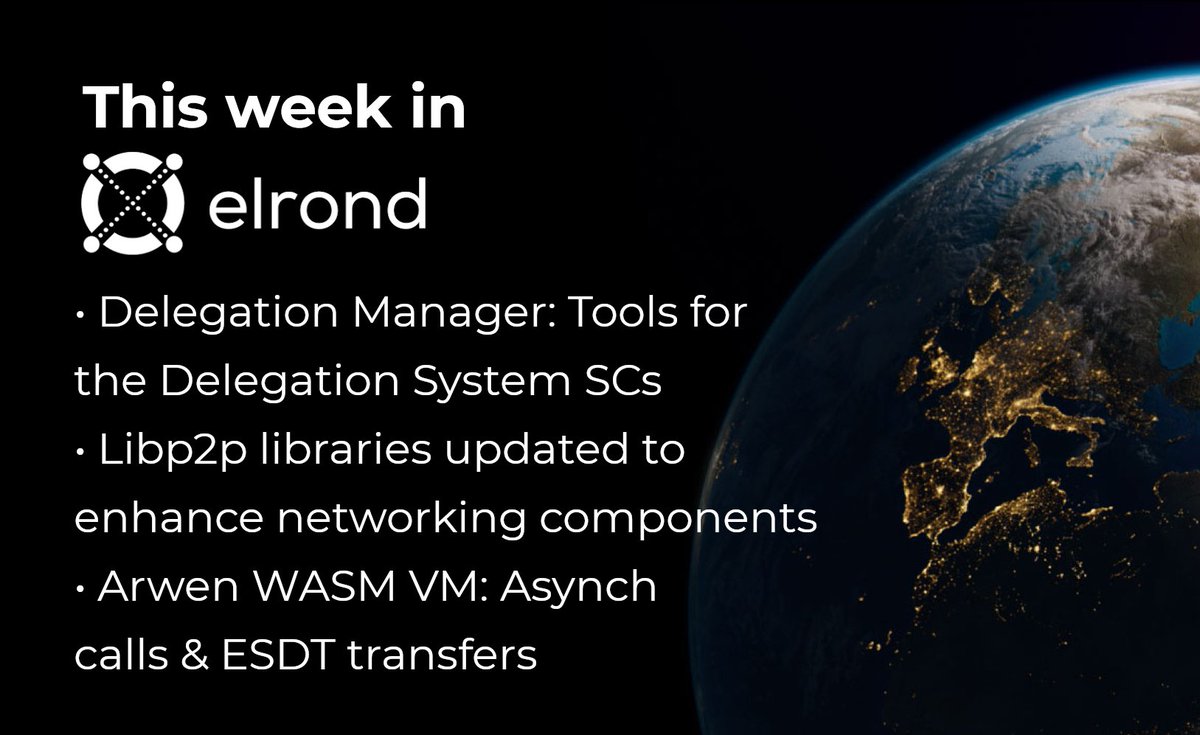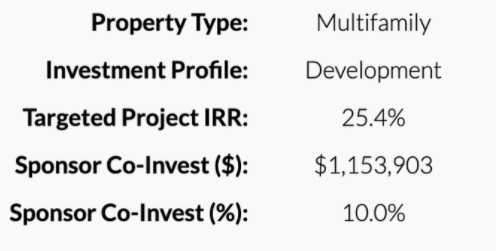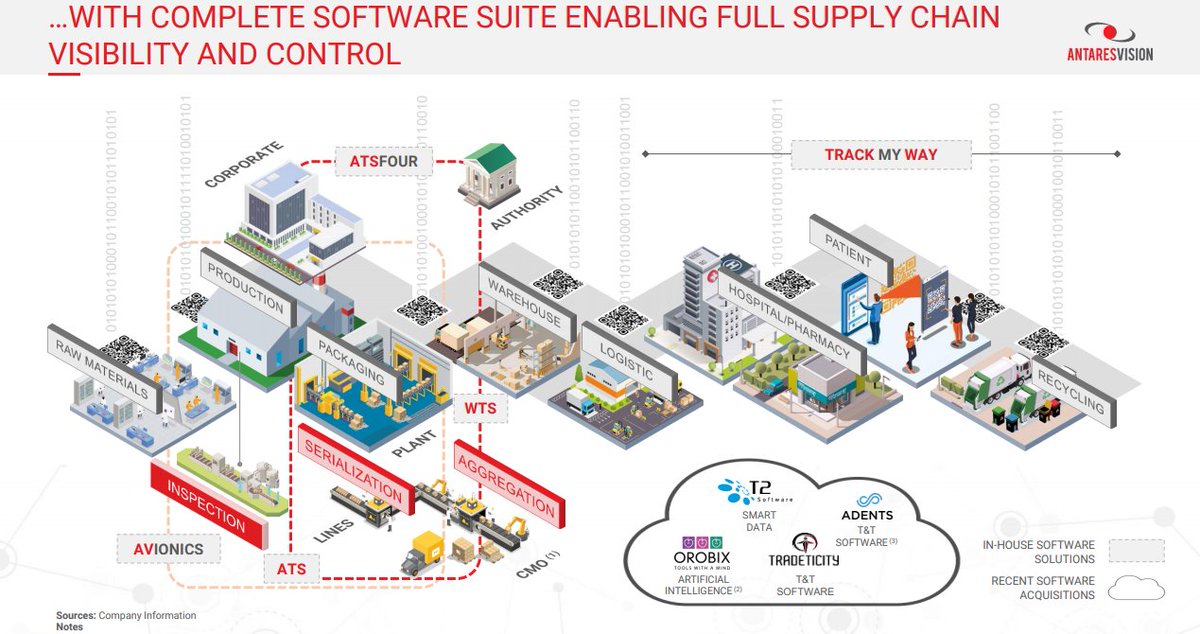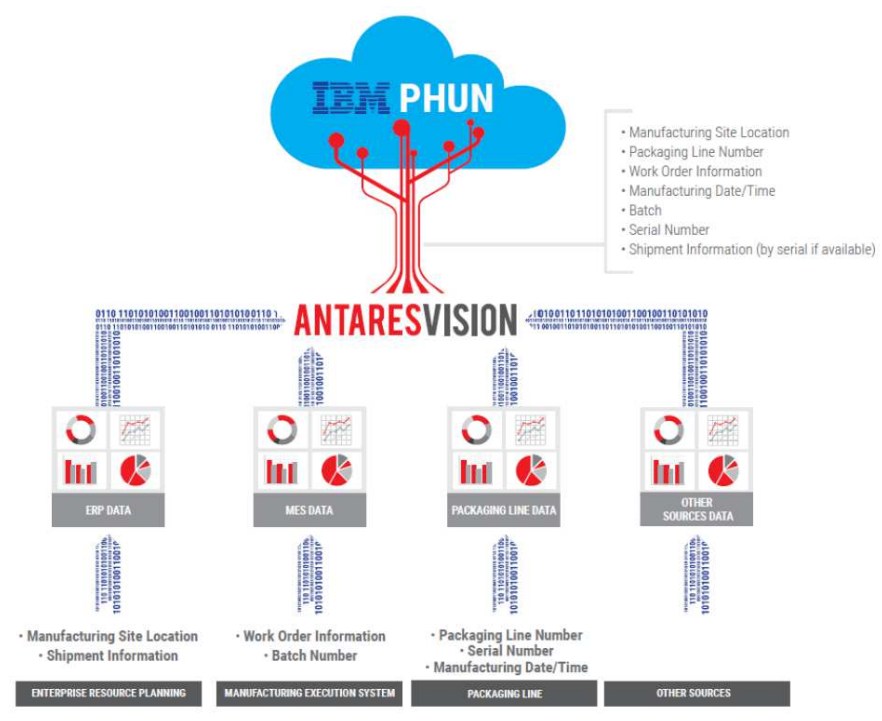https://t.co/FTVIwYWKMh
Thanks to the growing number of people who @getMaiar & engage with the @ElrondNetwork ecosystem, the number of accounts doubled to over 320k & we’re over 2.5M TXs, an unprecedented adoption level for a 6 months-young mainnet.
#hypergrowth100 Day 40
Weekly #elrondtech ⬇️

https://t.co/FTVIwYWKMh
https://t.co/29I6YRtjud
https://t.co/wh6BIBeDUd
- Integrated new Arwen and new features of Arwen into elrond-go. Added a set of integration tests for different scenarios.
- Fixed a bug in Arwen VM which did not let one contract to deploy multiple contracts.
- Testing the new Arwen async-calls & promises
- Arwen & elrond-wasm testing of various scenarios involving async calls and ESDT token transfers.
- Continuous integration improvements - run tests on pull request (arwen-wasm-vm - added; elrond-wasm-rs - in progress)
Learn more about our VM: https://t.co/U6R1xN4gb5
- Worked on the NFT standard for elrond-go. Sharded NFTs where users will keep their one NFTs at their own address. A lot of features here: like creating a brand, creating a marketplace without smart contract (will accept any value - ESDT / eGLD).
- Updated all other major 3-rd party libraries to their latest versions
- Fixed several tests that had nondeterministic execution paths leading to different code coverage values.
- Working on an ERC1155 smart contract
- Finalized unit tests for block execution invariant
- Refactored transaction coordinator with arguments
- Ledger Nano S tests after deploying of the latest version.
- Added a response logger middleware on Elrond Proxy so we can have a better overview over failing requests
- Analyzed the runtime memory usage of the Elrond node.
- Worked on support for Testnet BTC on our fork of Trust Wallet Core (this feature will be used on Maiar).
- Fixed a concurrency issue on Observers, within the VM Querying components
- Sketched a Python prototype for trivial secret splitting (involving one-time pads and basic modular arithmetic) - could be useful for Maiar in the future.
- Working on automatic elrond-sdk docs publishing
- Investigate failed relayed TXs from the backend.
- Refactored API resolvers and adapted the latest changes in economics to the soft restart feature branch.
- Create logs parsing tool for bad transactions and used it to identify/debug some user registration failures in Maiar.
- Started to improve overall error logging in elrond-go
- Work on TransactionConverter to replace function references in other components
- Tested different branches to ensure compatibility & protocol overall quality
- Implemented a disabled node facade for the new API refactoring & the unit tests to ensure code coverage
- Working on chainlink - aggregator smart contract
- Continue to working on the task to move all the elastic indexer code in a new repository
@ElrondNetwork ecosystem. Check our progress & get involved 👇
https://t.co/YOoeEN0RIF
More from Business
You May Also Like
A list of cool websites you might now know about
A thread 🧵
1) Learn Anything - Search tools for knowledge discovery that helps you understand any topic through the most efficient
2) Grad Speeches - Discover the best commencement speeches.
This website is made by me
3) What does the Internet Think - Find out what the internet thinks about anything
4) https://t.co/vuhT6jVItx - Send notes that will self-destruct after being read.
A thread 🧵
1) Learn Anything - Search tools for knowledge discovery that helps you understand any topic through the most efficient
2) Grad Speeches - Discover the best commencement speeches.
This website is made by me
3) What does the Internet Think - Find out what the internet thinks about anything
4) https://t.co/vuhT6jVItx - Send notes that will self-destruct after being read.
“We don’t negotiate salaries” is a negotiation tactic.
Always. No, your company is not an exception.
A tactic I don’t appreciate at all because of how unfairly it penalizes low-leverage, junior employees, and those loyal enough not to question it, but that’s negotiation for you after all. Weaponized information asymmetry.
Listen to Aditya
And by the way, you should never be worried that an offer would be withdrawn if you politely negotiate.
I have seen this happen *extremely* rarely, mostly to women, and anyway is a giant red flag. It suggests you probably didn’t want to work there.
You wish there was no negotiating so it would all be more fair? I feel you, but it’s not happening.
Instead, negotiate hard, use your privilege, and then go and share numbers with your underrepresented and underpaid colleagues. […]
Always. No, your company is not an exception.
A tactic I don’t appreciate at all because of how unfairly it penalizes low-leverage, junior employees, and those loyal enough not to question it, but that’s negotiation for you after all. Weaponized information asymmetry.
Listen to Aditya
"we don't negotiate salaries" really means "we'd prefer to negotiate massive signing bonuses and equity grants, but we'll negotiate salary if you REALLY insist" https://t.co/80k7nWAMoK
— Aditya Mukerjee, the Otterrific \U0001f3f3\ufe0f\u200d\U0001f308 (@chimeracoder) December 4, 2018
And by the way, you should never be worried that an offer would be withdrawn if you politely negotiate.
I have seen this happen *extremely* rarely, mostly to women, and anyway is a giant red flag. It suggests you probably didn’t want to work there.
You wish there was no negotiating so it would all be more fair? I feel you, but it’s not happening.
Instead, negotiate hard, use your privilege, and then go and share numbers with your underrepresented and underpaid colleagues. […]
1/“What would need to be true for you to….X”
Why is this the most powerful question you can ask when attempting to reach an agreement with another human being or organization?
A thread, co-written by @deanmbrody:
2/ First, “X” could be lots of things. Examples: What would need to be true for you to
- “Feel it's in our best interest for me to be CMO"
- “Feel that we’re in a good place as a company”
- “Feel that we’re on the same page”
- “Feel that we both got what we wanted from this deal
3/ Normally, we aren’t that direct. Example from startup/VC land:
Founders leave VC meetings thinking that every VC will invest, but they rarely do.
Worse over, the founders don’t know what they need to do in order to be fundable.
4/ So why should you ask the magic Q?
To get clarity.
You want to know where you stand, and what it takes to get what you want in a way that also gets them what they want.
It also holds them (mentally) accountable once the thing they need becomes true.
5/ Staying in the context of soliciting investors, the question is “what would need to be true for you to want to invest (or partner with us on this journey, etc)?”
Multiple responses to this question are likely to deliver a positive result.
Why is this the most powerful question you can ask when attempting to reach an agreement with another human being or organization?
A thread, co-written by @deanmbrody:
Next level tactic when closing a sale, candidate, or investment:
— Erik Torenberg (@eriktorenberg) February 27, 2018
Ask: \u201cWhat needs to be true for you to be all in?\u201d
You'll usually get an explicit answer that you might not get otherwise. It also holds them accountable once the thing they need becomes true.
2/ First, “X” could be lots of things. Examples: What would need to be true for you to
- “Feel it's in our best interest for me to be CMO"
- “Feel that we’re in a good place as a company”
- “Feel that we’re on the same page”
- “Feel that we both got what we wanted from this deal
3/ Normally, we aren’t that direct. Example from startup/VC land:
Founders leave VC meetings thinking that every VC will invest, but they rarely do.
Worse over, the founders don’t know what they need to do in order to be fundable.
4/ So why should you ask the magic Q?
To get clarity.
You want to know where you stand, and what it takes to get what you want in a way that also gets them what they want.
It also holds them (mentally) accountable once the thing they need becomes true.
5/ Staying in the context of soliciting investors, the question is “what would need to be true for you to want to invest (or partner with us on this journey, etc)?”
Multiple responses to this question are likely to deliver a positive result.






















